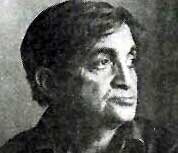
In the last few weeks, India lost two literary figures: eminent Hindi writer Nirmal Verma and Punjabi poetess and novelist, Amrita Pritam.
While I did not have the pleasure of reading Amrita's novels or poetry, I had the good fortune of reading some stories and novels by Nirmal Verma. For the uninitiated, Nirmal Verma is among the most significant names in contemporary Hindi literature. He shot to prominence with his first collection of short stories, Parinde ("Birds," 1959), which gave a major boost to the Nayi Kahani (New Story) movement in Hindi literature. He reinterpreted and reshaped the short story in Hindi, India’s national language. His "art powerfully communicates the elusiveness and complexities of emotions and sensibilities in a way that no narrative can," it noted. Verma has several short stories collections, novels, essays, and travelogues to his credit. I have done a profile of Verma in my latest column in Kitaab. Check it out here (see under Columnists).
For Amrita's profile, there's one by Khushwant Singh (An Stamped Ticket; Outlook) whose "uncharitable remarks" about the deceased poetess has kicked a mini literary storm in the Punjabi literary circles. Excerpts from Mr. Singh's appraisal:
"Amrita was a woman of modest education and wrote only in Punjabi. She could barely read any other language and was therefore unsophisticated in her writing. She was besotted with Bollywood. For her, the ultimate in success was to have some of her novels and short stories filmed. Her first novel to be translated from Punjabi into English was Pinjar (The Skeleton). I did the translation, purely out of love for her. I gave her all the royalties on one condition: to repay me with a candid account of her love life. She did over many sessions. The only passion she admitted to was for the film lyricist Sahir Ludhianvi whom she had never met. But she had corresponded with him. I was disappointed. "All this could be written on a postage stamp," I told her. So when she wrote her autobiography, she called it Raseedi Ticket (Postage Stamp)."
The piece gets more frank as you read further. I am not surprised as it comes from a writer who had written his own obituary!

No comments:
Post a Comment